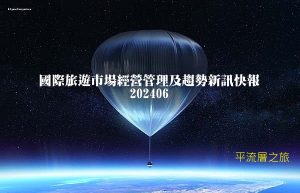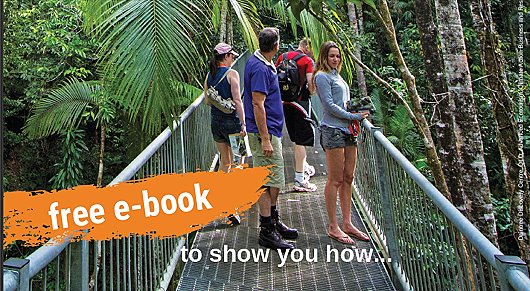
澳洲生態旅遊協會(Ecotourism Australia,EA)日前出版2020年澳洲生態旅遊電子書(Ecotourism Australia e-book 2020),主題為「您想成為一位生態旅遊經營者嗎?」(SO YOU WANT TO BE AN ECOTOURISM OPERATOR?),是一本可以提供生態旅遊經營者相關訊息、經營靈感以及實務技巧,並強化企業體質的參考書籍(it’s full of information, inspiration and practical tips that can transform your business.)。
(註:該書講的「ECOTOURISM OPERATOR」我翻譯成「生態旅遊經營者」,包含公營與私營的生態旅遊地、旅宿、餐飲、交通、解說及相關產業的經營者,可以是官方管理單位、公家或民營企業、社區、民間團體、個體業者等。)
內文提及生態旅遊經營者八個營運重點以及應構思的十件事,我覺得甚具參考價值,於是翻譯成中文分享於下,請參考。
打造永續經營的生態旅遊業 Building a sustainable ecotourism business
生態旅遊,顧名思義就是在自然地區的永續旅遊。 換句話說,所有生態旅遊都是永續旅遊,但並非所有永續旅遊都是生態旅遊。 如果您為客戶提供的體驗主要以自然為主題,那麼您將有能力建立生態旅遊業務。
Ecotourism, by definition, is sustainable tourism in natural areas. In other words, all ecotourism is sustainable, but not all sustainable tourism is ecotourism. If the experiences you offer to your customers primarily revolve around nature, you are perfectly positioned to build an ecotourism business.
在新冠肺炎(COVID-19)爆發之前,環遊世界的人數比以往任何時候都多,並且愈來愈多,但新的挑戰出現了:例如,2018年的研究顯示,旅遊業佔世界溫室氣體排放量的8%。 甚且,每年有800萬噸的塑膠廢棄物最終進入海洋,一些旅遊目的地則因「超限旅遊」而瀕臨崩潰。 疫情後,隨著旅遊業的重建,生態旅遊可以幫助應對這些挑戰。
Before COVID-19, more people were travelling the world than ever before and as more people travelled, new challenges arose: for example, research from 2018 showed that the tourism industry accounted for 8% of the world’s greenhouse gas emissions. On top of that, eight million tonnes of plastic were ending up in our oceans every year and some destinations were on the brink of collapse due to overtourism. Ecotourism can help tackle these challenges as the tourism sector rebuilds.
生態旅遊不僅僅是照顧自然環境。 下圖顯示了生態旅遊業者的八個營運重點,如果管理得當,它們可以幫助企業確保旅遊體驗能為人們創造更好的生活環境和旅遊場所。旅遊業做得好,可以成為積極變化的力量,促進對環境和文化的理解、欣賞與保護。
Ecotourism is not just about looking after the natural environment. The diagram below shows eight key areas that, when managed well, help businesses to ensure that tourism experiences create better places for people to live in and better places for people to visit.
Tourism done well can be a force for positive change, fostering environmental and cultural understanding, appreciation and conservation.
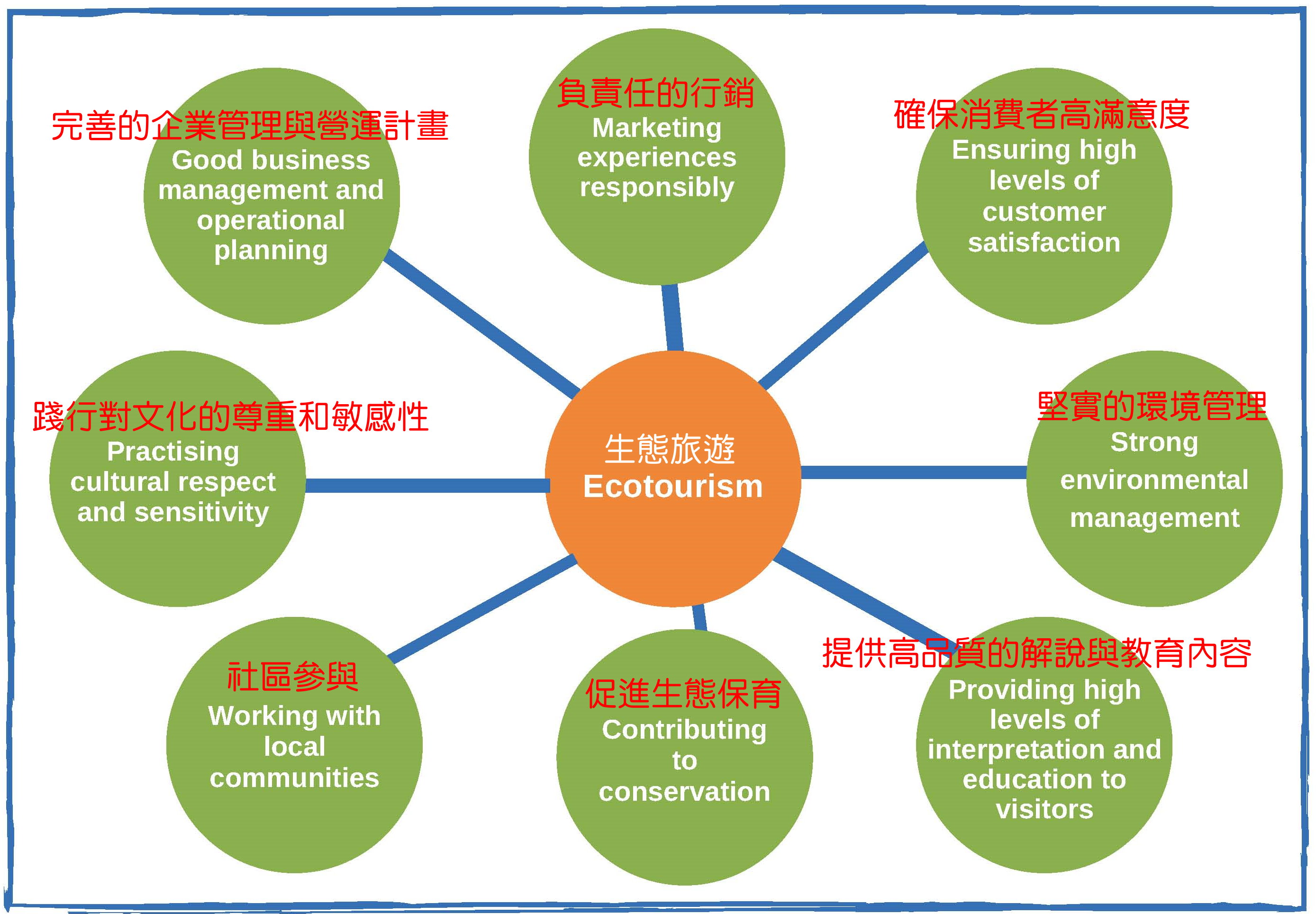
生態旅遊經營者應構思的十件事 Ten things you can start thinking about today
使用此清單開始思考與生態旅遊架構相副的自然旅遊業務範疇
Use this list to start thinking about the areas of your nature-based tourism business which are in line with the ecotourism framework.
四重底線:真正永續發展的企業在實踐經濟、環境、社會和文化上的永續性。 您的企業考慮過所有這些要素嗎?
The quadruple bottom line: A truly sustainable business is economically, environmentally, socially and culturally sustainable. Have you considered all of these elements in your business?
沒有客戶,就沒有生意。 無論您的服務內容是否基於自然元素,成功企業的經營之道就是確保您的客戶滿意並感受到被傾聽。您有評量過客戶滿意度嗎?
Without your customers, you wouldn’t have a business. Ensuring that your customers are happy and feel listened to is an essential part of running a successful business – nature-based or not. Are you measuring customer satisfaction?
沒有自然,您的生意將不存在。您如何評估和保護企業所依賴的自然環境,並鼓勵您的遊客也這麼做?
Without nature, your business wouldn’t exist. How are you valuing and protecting the natural environments your business relies on, and encouraging your visitors to do the same?
環境管理不僅僅是使用「綠色」清潔產品或正確回收利用。您是否想過排放了多少溫室氣體,衡量過產生的廢棄物量或盡可能減少水和能源的消耗?
Environmental management is about more than just using ‘green’ cleaning products or correctly recycling. Have you thought about your emissions, measured the amount of waste you produce or put processes in place to minimise water and energy use?
氣候變化是確實的。您的企業有無努力減少碳排放? 您是否制定了應對氣候變化的計畫?
Climate change is real. What is your business doing to minimise its carbon emissions? Have you got a plan in place for your business to manage the impacts of a changing climate?
教育是關鍵。 當遊客回家後,還記得您教給他們什麼? 從您提供的體驗中獲得的新知識會改變他們的生活嗎? 誰在教他們?他們的環境素養有提升嗎?
Education is key. What are you teaching your visitors that they will take with them when they go home? Will their lives have been changed by new knowledge gained from the experiences you offer? Who is teaching them, and are they knowledgeable?
您的企業可以對生態保育做出貢獻。 您是否參與了任何生態保育計畫?
Your business can contribute to real conservation outcomes. Are you involved in any conservation projects?
您的業務對當地社區很重要。 您的企業是否有助於在地人的生活環境更美好?您是如何做的?
Your business matters to the local community. Is your business contributing to making your region a better place for locals to live? How?
文化上的尊重和敏感性可以改善您的企業與在地人的關係。 您是否與您經營的土地和水域的傳統所有者有所連結? 您如何與訪客分享世界上最古老的生活文化?
Cultural respect and sensitivity improve relationships. Are you connected to the Traditional Owners of the lands and waters in which you operate? How are you sharing the world’s oldest living culture with your visitors?
永續發展是每個人的事。 您是否成功經營永續發展企業取決於您的員工、供應商和其他權益相關者的參與。
Sustainability is everyone’s business. How successful you are in running a sustainable business will depend on the involvement of your staff, suppliers and other stakeholders.
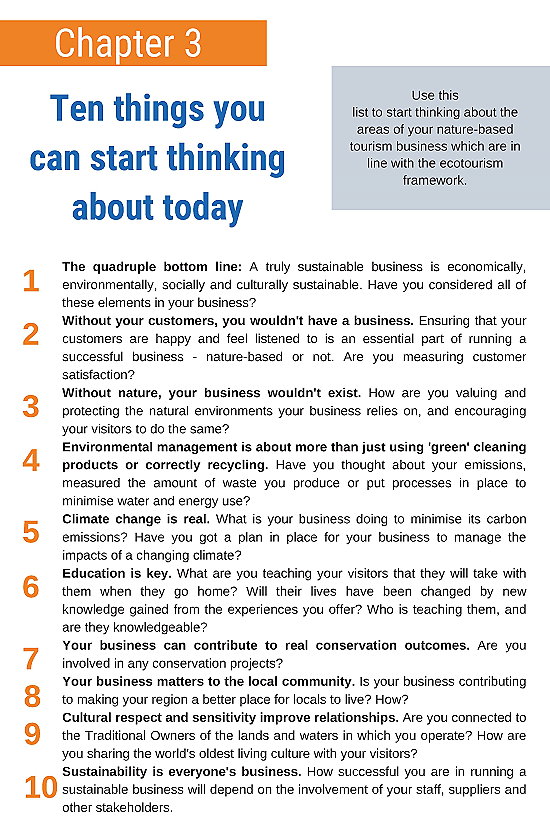
從這裡到哪裡? Where to from here?
那麼,您如何對待這份清單呢? 如果您已經做了很多上述事情,那就太好了, 您已走在正確的道路上。 如果您還有一段路要走,請別擔心,記住,這是一段旅程,無論大小,每一步都很重要。 您應考慮獲得標章認證(這是一個出色的業務開發工具),並將此清單作為讓您不斷回頭省思的便利工具。
So, how did you go with the list? If you’re doing a lot of those things already, great! You’re on the right path. If you’ve still got a way to go, don’t worry – remember that this is a journey, and every step counts, no matter how big or small. Consider getting certified (it’s a great business development tool!) and keep the list as a handy tool to keep coming back to
當您的企業正走在永續發展的路上時,須要記住的一些事情如下:
as you develop in your sustainability journey as a business. Some things to remember:
1.起而行
無論您是處於開業初期還是已經工作了很多年,起步永遠不嫌早或遲。 重要的是,您要進入並開始行動。
1.Jump in
It’s never too late or too early to start, whether you’re still in the early stages of setting up your business or whether you’ve been around for years. The important thing is that you jump in and get started.
2.務實一點
不要試圖一次完成所有目標。 請記住,變得更具永續性是在於您的企業進行了真正的變革,這將為您、您的環境和社區帶來長期利益。 成功將以小塊、易於管理的方式呈現。 過程比目的更重要!
2.Be realistic
Don’t try to achieve everything at once. Remember, becoming more sustainable is about making real changes in your business that will have long term benefits for you, your environment and your community. Success will come in small, manageable chunks. It’s about the journey, not the destination!
3.勇敢一點
作為領導者需要勇氣。 您可能須要走出自己的舒適區,做出一些困難的決定並遭到反對。 如果您相信它,那就堅持下去。好處將超過挑戰。
3.Be bold
Being a leader takes courage. You will probably be required to step outside your comfort zone, make some difficult decisions and come up against opposition. If you believe in it, stick with it. The benefits will outweigh the challenges.
4.要有創意
進入新領域,您必須跳脫舊思維框架。 但請放心,澳大利亞各地的許多其他旅遊業者和企業也正在此旅程中,因此您並不孤單。不要害怕看到別人在做什麼,而他們正在做的永續發展行動正可以激發您事業創新的靈感。
4.Be creative
Stepping into new territory requires you to think outside the box. But don’t worry –lots of other tourism operators and businesses around Australia are on this journey as well, so you’re not alone. Don’t be afraid to see what others are doing and use their sustainability initiatives as inspiration for your own business.
5.要有誠信
現在的旅行者可以分辨出真假永續發展企業的區別。 準備好用事實和例子支持您的任何主張。 誠實說明您的企業為了永續發展所做的改變,並將其納入您的業務介紹中。
5. Be honest
Today’s travellers can tell the difference between a business that says it’s sustainable and one that is sustainable. Be prepared to back up any claims with facts and examples. Be honest about the changes you’re making and build these into your business narrative.
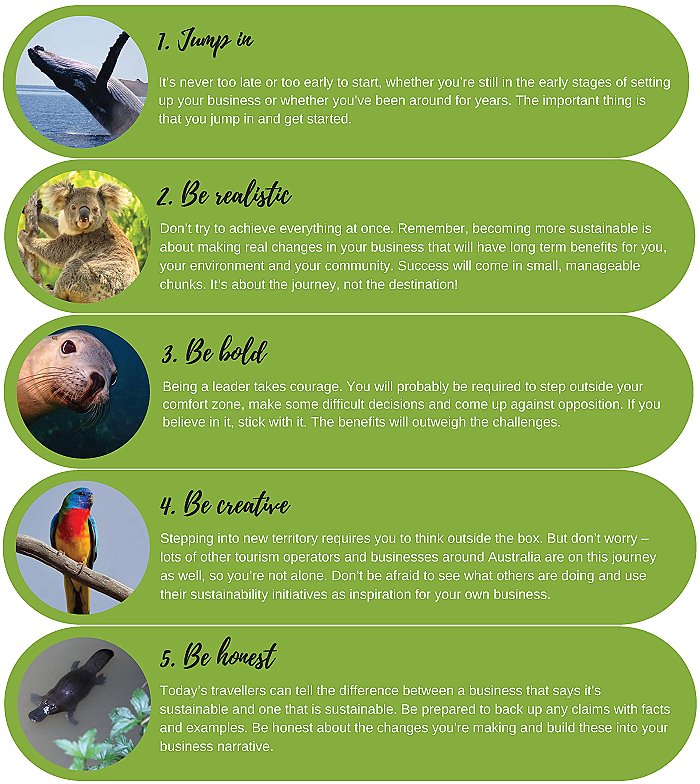
延伸閱讀:
澳洲昆士蘭生態旅遊考察簡要心得—資源面、政策面、組織面、操作面概述
台灣與澳洲雙方生態旅遊協會簽訂合作備忘錄(相片)-20141124
世界自然保育聯盟(IUCN)對生態旅遊的定義(中英對照及其出處)
國際生態旅遊學會對生態旅遊的定義(中英對照)-2015年新定義
本部落格「生態旅遊或觀光遊憩」、「環境保護」、「環保旅宿」、「導覽解說」、「生態保育」等專欄各文


